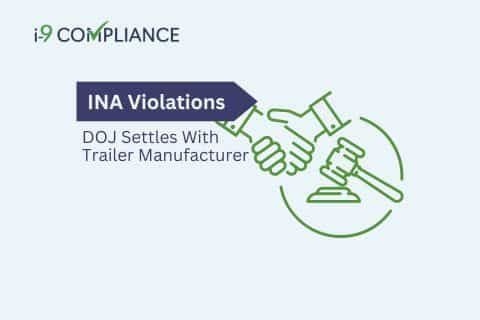DOJ Settles Alleged INA Violations With Trailer Manufacturer

The Department of Justice (DOJ) has announced that it has reached a settlement agreement with a trailer manufacturer. According to the suit, the settlement addressed allegations that the company had requested unnecessary documentation from lawful non-citizen workers.
This settlement resolves the DOJ’s determination that the employer violated the Immigration and Nationality Act (INA). One violation concerns how the employer conducted their employment eligibility verification (Form I-9) process. This violation led to a lawful permanent resident filing a complaint with the DOJ, which sparked the Department’s investigation. Based on this investigation, the DOJ determined that the employer had requested unnecessary documentation from non-U.S. citizens to verify their authorization to work in the United States.
This unnecessary request violated the INA and impacted the worker who filed the complaint. According to the plaintiff, the employer requested additional documentation based on his immigration status. They wanted this information to verify his permission to work despite the worker providing his state ID and an unrestricted Social Security card. This documentation is enough to verify an individual’s permission to work. However, the employer allegedly requested more information from a Green Card, also called a Permanent Resident Card.
The DOJ concluded that the employer refused to hire applicants that did not provide additional documentation. Furthermore, the Department found that the employer frequently requested documentation from existing Lawful Permanent Resident employees. These requests concerned reverifying their permission to work in the U.S. despite the INA not requiring this information.
Lawful Permanent Residents, like other citizen or non-citizen workers, may present any acceptable mix of documentation they choose to fill out Form I-9s. Most importantly, the I-9 process does not require workers to provide green cards or verify their immigration status. The INA explicitly prohibits employers from requesting any different or additional documents beyond what Form I-9 lists.
According to Assistant Attorney General Kristen Clarke of the DOJ’s Civil Rights Division, “It is unlawful for employers to add discriminatory barriers in the hiring process because of a worker’s citizenship or immigration status. The Justice Department is committed to ensuring that workers enjoy the protections the law provides, including where barriers to employment are discriminatory.”
Under the settlement agreement, the employer will pay civil penalties of $218,000. The employer must also establish a back-pay fund to compensate those affected by the allegedly unfair documentary practices. In addition, the Civil Rights Division’s Immigration and Employee Rights Section has provided employers with a fact sheet on avoiding discrimination when verifying an individual’s permission to work in the United States.
For employers, the best way to help ensure compliance with employment eligibility verification regulations is to incorporate an electronic I-9 management system with E-Verify integration. This system can help automate the process while providing constant guidance to HR personnel and digital storage for I-9 forms and documentation.
Learn more about automating your employment eligibility verification and ensuring compliance with I-9Compliance.